
By Rob Shaul
I’m a voracious reader of non-fiction and try to read or listen to 1-2 books/week.
I consider this type of reading, “Expansion Literature” – designed to introduce me to ideas and thoughts outside of my specific career area.
Most books leave no impression. Below are 20 I’ve read over the past 6-8 months that did, and I can recommend strongly.
Read any impactful books lately? Email me the title and why, and I’ll share it with the rest of the MTI community.
1. Tailspin: The People and Forces Behind Americas Fifty-Year Fall – and Those Fighting to Reverse It, by Steven Brill.
 Steven Brill offers up an interesting explanation for America’s growing inequality: Meritocracy. High achievers make it, set up systems and coach/guide their children to the best schools, best jobs, and eventually using government regulations, money-based political lobbying, and other mechanisms to create “moats” protecting their wealth and elitism. Examples include financial mechanisms and corporate legal defenses which concentrate wealth. He argues that unlike the “blue bloods” of the past elite, these new meritocratic elite don’t have any sense of duty or obligation to the society as a whole. Thought-provoking in that it causes you to question the focus on personal achievement without a sense of duty to a greater good.
Steven Brill offers up an interesting explanation for America’s growing inequality: Meritocracy. High achievers make it, set up systems and coach/guide their children to the best schools, best jobs, and eventually using government regulations, money-based political lobbying, and other mechanisms to create “moats” protecting their wealth and elitism. Examples include financial mechanisms and corporate legal defenses which concentrate wealth. He argues that unlike the “blue bloods” of the past elite, these new meritocratic elite don’t have any sense of duty or obligation to the society as a whole. Thought-provoking in that it causes you to question the focus on personal achievement without a sense of duty to a greater good.
2. What Doesn’t Kill Us: How Freezing Water, Extreme Altitude and Environmental Conditioning Will Renew Our Lost Evolutionary Strength, by Scott Carney
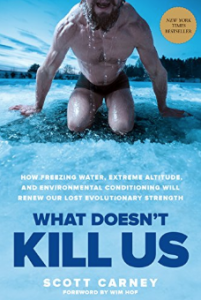 Interesting deep dive into the possible physiological benefits and potential fitness performance improvements built through cold exposure and breath-holding techniques. Some of this stuff is faddy now and practiced by celebrity coaches working with actors in Hollywood or made-for youtube “extreme” training experiments conducted by RedBull. We’ve messed around with water confidence training for mountain athletes ourselves, but questioned the transferability outside the specific mode. In general, I’m very suspicious of any life or performance “hack” – as they aren’t sustainable, but did find this book and some of the training modes interesting.
Interesting deep dive into the possible physiological benefits and potential fitness performance improvements built through cold exposure and breath-holding techniques. Some of this stuff is faddy now and practiced by celebrity coaches working with actors in Hollywood or made-for youtube “extreme” training experiments conducted by RedBull. We’ve messed around with water confidence training for mountain athletes ourselves, but questioned the transferability outside the specific mode. In general, I’m very suspicious of any life or performance “hack” – as they aren’t sustainable, but did find this book and some of the training modes interesting.
3. Radical Markets: Uprooting Capitalism and Democracy for a Just Society, by Eric Posner and Glen Weyl
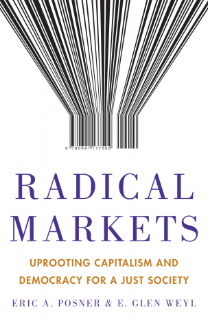 Super interesting and thought-provoking ideas which target many of the inefficiencies and inertia of business and government and society offer unique, market-based ideas on how to address them. For example, when it comes to voting and elections, what if you could “save” your votes … i.e. chose not to vote when issues or candidates didn’t interest you, but have those non-votes “stockpile” – then use them all at once when an issue or candidate arrived which you felt passionate about? Interesting, huh?
Super interesting and thought-provoking ideas which target many of the inefficiencies and inertia of business and government and society offer unique, market-based ideas on how to address them. For example, when it comes to voting and elections, what if you could “save” your votes … i.e. chose not to vote when issues or candidates didn’t interest you, but have those non-votes “stockpile” – then use them all at once when an issue or candidate arrived which you felt passionate about? Interesting, huh?
4. Homo Deus: A Brief History of Tomorrow by Yuval Noah Harari
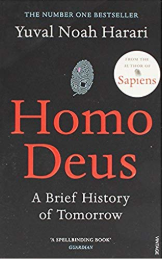 Havari’s book “Sapiens” was super informative and impressive. One of its key takeaways was that there were several different species of hominoids when our species “homo sapiens” arrived on the scene. We killed ’em all! With this book, Harari ponders the next species of hominoids which will lead to our extinction …. driven by genetic modification and artificial intelligence.
Havari’s book “Sapiens” was super informative and impressive. One of its key takeaways was that there were several different species of hominoids when our species “homo sapiens” arrived on the scene. We killed ’em all! With this book, Harari ponders the next species of hominoids which will lead to our extinction …. driven by genetic modification and artificial intelligence.
5. Adaptive Markets: Financial Evolution at the Speed of Thought by Andrew W. Lo
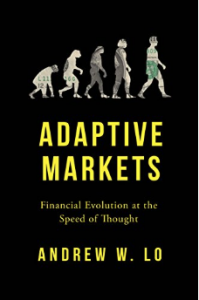 The traditional idea of efficient markets mirrors the principles of physics – money moves around like thermodynamics – with “hot” and “cold” influences. Lo challenges this idea and offers rather that finance is better described by biology, and finance “evolves” to meet new and changing opportunities. For example, trading speed driven by computers and electronic market systems has increased exponentially, and new financial products and practices have “evolved” as a result. This can be super damaging – as demonstrated by the derivatives and other questionable financial products which resulted in the 2007 housing crash – but also powerfully enriching for the investor who understands this dynamic.
The traditional idea of efficient markets mirrors the principles of physics – money moves around like thermodynamics – with “hot” and “cold” influences. Lo challenges this idea and offers rather that finance is better described by biology, and finance “evolves” to meet new and changing opportunities. For example, trading speed driven by computers and electronic market systems has increased exponentially, and new financial products and practices have “evolved” as a result. This can be super damaging – as demonstrated by the derivatives and other questionable financial products which resulted in the 2007 housing crash – but also powerfully enriching for the investor who understands this dynamic.
6. Blockchain: Ultimate Guide to Understanding Blockchain, Bitcoin, Cryptocurrencies, Smart Contracts and the Future of Money, by Mark Gates
I listened to this at the height of Bitcoins market value six months ago – when CNBC commentators couldn’t stop talking about it. The key takeaway is not the plethora of cryptocurrencies, but rather the blockchain technology behind them – and how this technology can act as a highly reliable financial ledger outside of any organizational or government oversight. It’s unclear at this early stage how blockchain and or cryptocurrencies will affect our day to day lives, but this book convinced me that there the blockchain technology is here to stay and will have impact.
6. The Science of Accelerated Learning: Advanced Strategies for Quicker Comprehension, Greater Retention, and Systematic Expertise, by Peter Hollins
 Solid, science-driven, condensed identification of the learning techniques that are the most effective including how to teach to learn. Some of this I have seen or read elsewhere, but this book puts it all in one place. Worth your time.
Solid, science-driven, condensed identification of the learning techniques that are the most effective including how to teach to learn. Some of this I have seen or read elsewhere, but this book puts it all in one place. Worth your time.
7. Endure: Mind, Body, and the Curiously Elastic Limits of Human Performance, by Alex Hutchinson
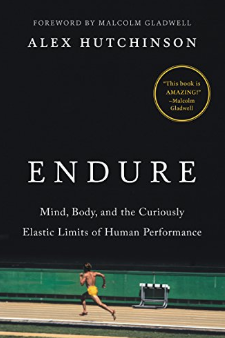
Deep dive into the many different methods coaches and others have used to push human performance – hydration techniques, cold therapy, nutrition and refueling techniques, equipment hacks, etc. One key takeaway for me – everything seems to work for a 1-3% performance improvement – even placebos. Why? The athlete believes it will improve his/her performance.
For the coach or the athlete, this book addresses directly the myths and conflicting evidence of many of the distractions product marketers pump at us. Great stuff.
8. How An Economy Grows And Why It Crashes, Peter Schiff, Andrew Schiff

Perhaps the best book I’ve read in the past 6 months – brothers Peter and Andrew Schiff begin with a simple parable – 3 guys on an island, each who catches one fish per day to survive – and build from there to explain investment in capital, finance, currency, bonds, debt, and international markets. Like it or not, everything begins with business and economics, and this book cut’s through the hype and hammers the fundamentals in a way which is easily understood and applied. Incredible.
9. Skin in the Game: Hidden Asymmetries in Daily Life, Nassim Nicholas Taleb
 Taleb became famous for his book The Black Swan. Here he directly questions the wisdom and advice of political and economic elites who offer opinions, and decide policy, but are unaffected directly by the failures of their policy prescriptions, and how not having any “skin in the game” leads to huge mistakes. Taleb descends into a rant at times, and the idea is redundant, but still powerful in it’s questioning of the ruling elite and their “solutions.”
Taleb became famous for his book The Black Swan. Here he directly questions the wisdom and advice of political and economic elites who offer opinions, and decide policy, but are unaffected directly by the failures of their policy prescriptions, and how not having any “skin in the game” leads to huge mistakes. Taleb descends into a rant at times, and the idea is redundant, but still powerful in it’s questioning of the ruling elite and their “solutions.”
10. Thinking in Bets: Making Smarter Decisions When You Don’t Have All the Facts, Annie Duke
 Excellent book on decision making from a world champion professional poker player with a pHD in Psychology – my two big take aways were understanding the difference between bad decisions and bad outcomes, and the importance of a peer group who will give you direct and honest feedback on your decisions and performance.
Excellent book on decision making from a world champion professional poker player with a pHD in Psychology – my two big take aways were understanding the difference between bad decisions and bad outcomes, and the importance of a peer group who will give you direct and honest feedback on your decisions and performance.
11. 12 Rules for Life: An Antidote to Chaos, Jordan Peterson
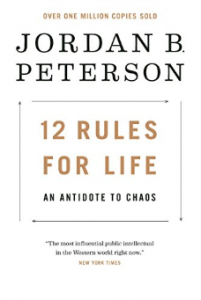 Jordan Peterson, an unassuming academic from Canada, is quickly becoming a siren singing an alternative to political correctness and championing masculinity and what it means to be a man. I wasn’t quite as impressed with his 12 rules as Joe Rogan and Tim Ferris – where Dr. Peterson has become a star on the podcast scene and a youtube star – where his videos and lectures have 35 million+ views. Regardless, his ideas and prescriptions have helped many men identify what is important and act. He is not a dynamic speaker, and his prescriptions are not easily digestible or deployed – but they are sincere and true.
Jordan Peterson, an unassuming academic from Canada, is quickly becoming a siren singing an alternative to political correctness and championing masculinity and what it means to be a man. I wasn’t quite as impressed with his 12 rules as Joe Rogan and Tim Ferris – where Dr. Peterson has become a star on the podcast scene and a youtube star – where his videos and lectures have 35 million+ views. Regardless, his ideas and prescriptions have helped many men identify what is important and act. He is not a dynamic speaker, and his prescriptions are not easily digestible or deployed – but they are sincere and true.
12. Principles: Life and Work, Ray Dalio
 “Principles” was widely recognized as the best business book last year. Ray Dalio is a hedge fund manager and this book outlines his unemotional, analytical approach to investing and organizational management. The management approach includes brutal honesty and evaluation, clear, unblinking identification of people’s strengths and building project teams based on these, and belief in artificial intelligence to enhance decision making. What is different about Dalio’s effort is the detail – he painstakingly goes into detail of the steps, tools and processes he’s developed to find success. At times this can read like an endless list – but it is not shallow and is appreciated.
“Principles” was widely recognized as the best business book last year. Ray Dalio is a hedge fund manager and this book outlines his unemotional, analytical approach to investing and organizational management. The management approach includes brutal honesty and evaluation, clear, unblinking identification of people’s strengths and building project teams based on these, and belief in artificial intelligence to enhance decision making. What is different about Dalio’s effort is the detail – he painstakingly goes into detail of the steps, tools and processes he’s developed to find success. At times this can read like an endless list – but it is not shallow and is appreciated.
13. Psyched Up: How the Science of Mental Preparation Can Help You Succeed, by Daniel McGinn
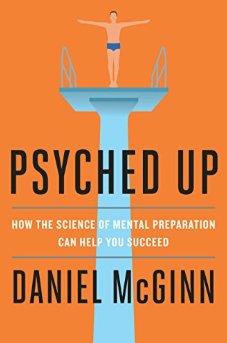 I’ve worked with several US Ski Team members and professional Freeskiers and have been continually surprised at the lack of any systematic process and training program for the mental game of their sports and performance. In the past I’ve read several books which prescribe mental preparation techniques. What makes McGinn’s book different is his overview of several approaches, and what research has learned about it’s effectiveness. The effort is full of tools to try and apply and reaches beyond sports to better mental preparation for any stressful performance.
I’ve worked with several US Ski Team members and professional Freeskiers and have been continually surprised at the lack of any systematic process and training program for the mental game of their sports and performance. In the past I’ve read several books which prescribe mental preparation techniques. What makes McGinn’s book different is his overview of several approaches, and what research has learned about it’s effectiveness. The effort is full of tools to try and apply and reaches beyond sports to better mental preparation for any stressful performance.
14. The Subtle Art of Not Giving a F*ck: A Counterintuitive Approach to Living a Good Life, Mark Manson
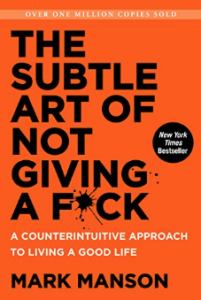 A popular self help book, what makes Manson’s ideas different is their countuitiveness. Instead of a constant focus on the positive, identify what is important to you, and toss aside everything else. “In life, we have a limited amount of fucks to give,” he writes, “So you must choose your fucks wisely.” Especially applicable for introverts or others allowing themselves to play a role which doesn’t fit.
A popular self help book, what makes Manson’s ideas different is their countuitiveness. Instead of a constant focus on the positive, identify what is important to you, and toss aside everything else. “In life, we have a limited amount of fucks to give,” he writes, “So you must choose your fucks wisely.” Especially applicable for introverts or others allowing themselves to play a role which doesn’t fit.
15. Stealing Fire: How Silicon Valley, the Navy SEALs, and Maverick Scientists Are Revolutionizing the Way We Live and Work, Steven Kotler, Jamie Wheal
 I really liked Kotler’s previous effort, “The Rise of Superman” – which explored the exponential advances in extreme sport performance. I wasn’t nearly as impressed with this effort, which included advice to take micro-doses of LSD to attain “flow”. Ultimately the authors try to sell a short cut to improved performance – and I’m not a believer in short cuts.
I really liked Kotler’s previous effort, “The Rise of Superman” – which explored the exponential advances in extreme sport performance. I wasn’t nearly as impressed with this effort, which included advice to take micro-doses of LSD to attain “flow”. Ultimately the authors try to sell a short cut to improved performance – and I’m not a believer in short cuts.
16. Competing Against Luck: The Story of Innovation and Customer Choice, Clayton Christensen, Taddy Hall
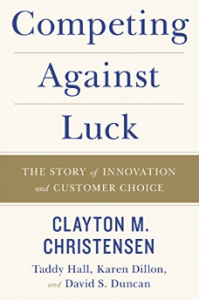 Christensen’s “The Innovator’s Dilemma” is one of the business books I refer to often. That effort was hindsight focused – and identified how products and companies were disrupted by newcomers. Here he works to help business identify new products which which will have traction in a unique way. Instead of trying to predict what customers need or want, identify “jobs that need done” and build products which do those jobs. It’s an interesting, enlightening insight.
Christensen’s “The Innovator’s Dilemma” is one of the business books I refer to often. That effort was hindsight focused – and identified how products and companies were disrupted by newcomers. Here he works to help business identify new products which which will have traction in a unique way. Instead of trying to predict what customers need or want, identify “jobs that need done” and build products which do those jobs. It’s an interesting, enlightening insight.
17. Never Split the Difference: Negotiating as if Your Life Depended on It, Chris Voss
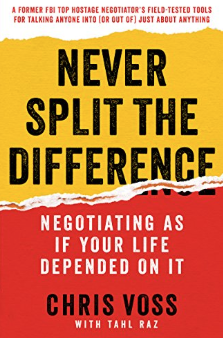 “Getting to Yes” has for years been the bible of negotiation theory. I’ve always thought it was terrible, and now, via Voss, a former FBI hostage negotiator, have an alternative. Never Split The Difference brings to negotiation and understanding that emotion is always evolved, and a practical set of tools and tactics you can deploy immediately in business or career negotiations, and to improve personal and family relationships. Great book.
“Getting to Yes” has for years been the bible of negotiation theory. I’ve always thought it was terrible, and now, via Voss, a former FBI hostage negotiator, have an alternative. Never Split The Difference brings to negotiation and understanding that emotion is always evolved, and a practical set of tools and tactics you can deploy immediately in business or career negotiations, and to improve personal and family relationships. Great book.
18. Hillbilly Elegy: A Memoir of a Family and Culture in Crisis, by J.D. Vance
 I was raised by a widowed Mom with 3 other siblings in a tiny Wyoming town. We were white working poor, but I never understood what this meant until I read Hillbilly Elegy. Vance’s upbringing – drug addict mother, raised by his grandparents – was different than mine, but the arc of his life is similar. His military service opened his eyes to a new world, new way of viewing life, and new possibilities. Hillbilly Elegy was referenced by many political pundits after Trump’s 2016 Presidential victory as it gives voice to the economic stagnation and challenged faced by many lower and lower middle class white Americans. Vance’s work is not just about his own personal story, but weaves in the larger economic forces (decline of manufacturing, etc.) which has hurt and stagnated the American Dream for many. This is an impactful work.
I was raised by a widowed Mom with 3 other siblings in a tiny Wyoming town. We were white working poor, but I never understood what this meant until I read Hillbilly Elegy. Vance’s upbringing – drug addict mother, raised by his grandparents – was different than mine, but the arc of his life is similar. His military service opened his eyes to a new world, new way of viewing life, and new possibilities. Hillbilly Elegy was referenced by many political pundits after Trump’s 2016 Presidential victory as it gives voice to the economic stagnation and challenged faced by many lower and lower middle class white Americans. Vance’s work is not just about his own personal story, but weaves in the larger economic forces (decline of manufacturing, etc.) which has hurt and stagnated the American Dream for many. This is an impactful work.
19. Meat Eater: Adventures from the Life of an American Hunter, Steven Rinella
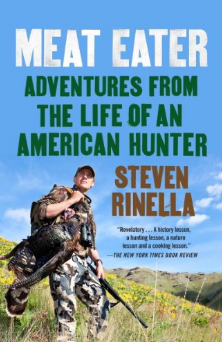 It took me a couple tries to get through Rinella’s effort, but was ultimately impressed by his unflinching look at hunting and trapping, his love for it and they way it connected him to the natural world, and was frankly entertained by his great hunting and fishing stories. As a self-taught, backcountry bow hunter, I’ve come to severely dislike the “celebrity hunter” types, and entire hunting entertainment industry which highlights the kill, only to be interrupted by efforts to sell you something you don’t need. Rinella is part of that now with his own TV show, etc., but this effort from 2012 predates this douche baggery, and is simply, great writing. Another I would recommend even more is Ted Kerasote’s Blood Ties: Nature, Culture and the Hunt.
It took me a couple tries to get through Rinella’s effort, but was ultimately impressed by his unflinching look at hunting and trapping, his love for it and they way it connected him to the natural world, and was frankly entertained by his great hunting and fishing stories. As a self-taught, backcountry bow hunter, I’ve come to severely dislike the “celebrity hunter” types, and entire hunting entertainment industry which highlights the kill, only to be interrupted by efforts to sell you something you don’t need. Rinella is part of that now with his own TV show, etc., but this effort from 2012 predates this douche baggery, and is simply, great writing. Another I would recommend even more is Ted Kerasote’s Blood Ties: Nature, Culture and the Hunt.
20. The Book of Why, Judea Pearl and Dana Mackenzie
 Uh … I’ll admit right up front, this book was way over my head quite a bit of the time. But, of all the books on this list of “expansion literature” – this perhaps opened my mind the most. Dr. Pearl is a professor at UCLA, and a recipient of the 2012 Turing Award – the “Noble Prize” for computer science. His work now is focused on artificial intelligence, but this book is really about the history of ideas, philosophy, and mathematics surrounding the differences between “cause” and “correlation”. It points to the significant limitations of traditional statistics. During his career, Dr. Pearl, his students, and colleagues, have developed sophisticated modeling tools which must be applied to data to identify and predict “cause” relationships. I don’t want to get too geeky here, but this technical tome brims with joy about the history of statistical thought, computer science, and intellectual discovery. How does it apply to artificial intelligence? Via the internet of things, we are currently producing gigantic volumes of data, but statistics alone are not powerful enough to discover what’s important. Dr. Pearl and his colleagues have developed modeling which deploys “counterfactuals” which aim to account for impacts from forces or decisions which didn’t occur. I’d explain more, but I’d just get myself in more trouble. The bigger point is artificial intelligence will need to deploy something like Dr. Pearls models to truly advance. Overall, these are very big, powerful, ideas.
Uh … I’ll admit right up front, this book was way over my head quite a bit of the time. But, of all the books on this list of “expansion literature” – this perhaps opened my mind the most. Dr. Pearl is a professor at UCLA, and a recipient of the 2012 Turing Award – the “Noble Prize” for computer science. His work now is focused on artificial intelligence, but this book is really about the history of ideas, philosophy, and mathematics surrounding the differences between “cause” and “correlation”. It points to the significant limitations of traditional statistics. During his career, Dr. Pearl, his students, and colleagues, have developed sophisticated modeling tools which must be applied to data to identify and predict “cause” relationships. I don’t want to get too geeky here, but this technical tome brims with joy about the history of statistical thought, computer science, and intellectual discovery. How does it apply to artificial intelligence? Via the internet of things, we are currently producing gigantic volumes of data, but statistics alone are not powerful enough to discover what’s important. Dr. Pearl and his colleagues have developed modeling which deploys “counterfactuals” which aim to account for impacts from forces or decisions which didn’t occur. I’d explain more, but I’d just get myself in more trouble. The bigger point is artificial intelligence will need to deploy something like Dr. Pearls models to truly advance. Overall, these are very big, powerful, ideas.
You Might Also Like Quiet Professional: On Professional Reading
STAY UPDATED
Sign-up for our BETA newsletter. Training tips, research updates, videos and articles - and we’ll never sell your info.
